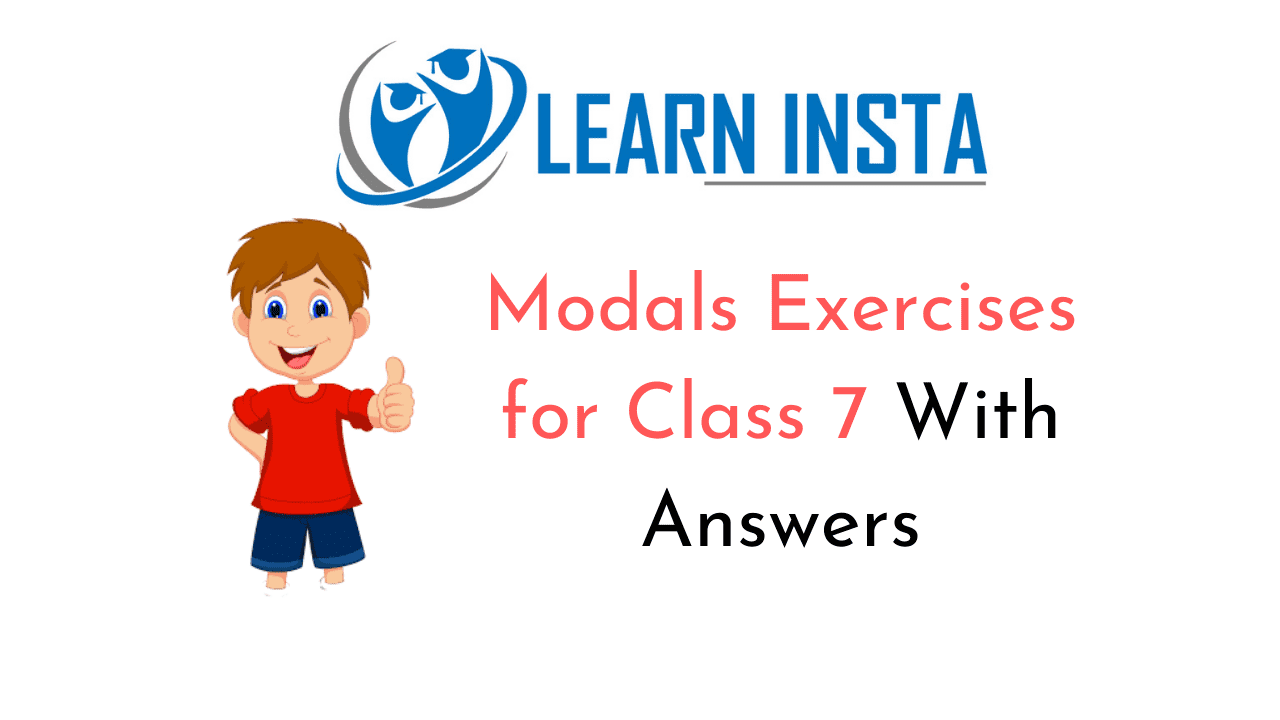
What are modal verb?
Modals (also called modal verbs, modal auxiliary verbs, modal auxiliaries) are special verbs which behave irregularly in English. They are different from normal verbs like “work, play, visit…” They give additional information about the function of the main verb that follows it. They have a great variety of communicative functions.
This grammar section explains Online Education English Grammar in a clear and simple way. There are example sentences to show how the language is used. You can also visit the most accurate and elaborate NCERT Solutions for Class 7 English. Every question of the textbook has been answered here. https://ncertmcq.com/modals-exercises-for-class-7/
Online Education for Modals Exercise For Class 7 CBSE With Answers PDF
Modals Exercises For Class 7
Fundamentals:
Modals are those helping verbs, which express the ‘mode’ or ‘manner’ of the actions indicated by the main verbs. They express ability, possibility, probability, permission, obligation, etc. The most commonly used modals are shall, should, will, would, can, could, may, might, must, ought to, used to, need, and dare.
Modals are used to:
Ask permission – may, can, could
Examples:
- May I come in?
- Could I use your pen, please?
Make a request – can, could
Examples:
- Could you please give me the doctor’s telephone number?
Express a possibility – may, might, could
Examples:
- It might rain during the night.
Give advice or suggestion – should
Examples:
- You should wear a helmet while riding your motorbike.
Express necessity or compulsion – must, have to
Examples:
- We must slow down while driving in front of the school.
- I have to submit my project by tomorrow.
Express prohibition – must not
Examples:
- You must not talk loudly in the library.
Express a promise or intention – will, shall
Examples:
- I will mail you my address.
Express a wish – may
Examples:
- May you have a long life!
A modal does not change according to the number or person of the subject.
Examples:
- He can learn. I can learn. You can learn. They can learn. We can learn.
A modal is always used with a verb in its basic form. The modal changes according to the tense.
While the main verb remains in its regular form.
Examples:
- I can run. I may run. I could run. I might run.
Modals can be used without a verb in response to a question.
Examples:
- Can you sing? I can.
- Will you sing? I will.
- Will you come? I may. /1 will.
Modals, when joined with ‘not’ to form a negative, can be contracted.
Examples:
- I cannot run. I can’t run.
- I do not run. I don’t run.
- I will not run. I won’t run.
Modals Worksheet For Class 7
Model Verb Can
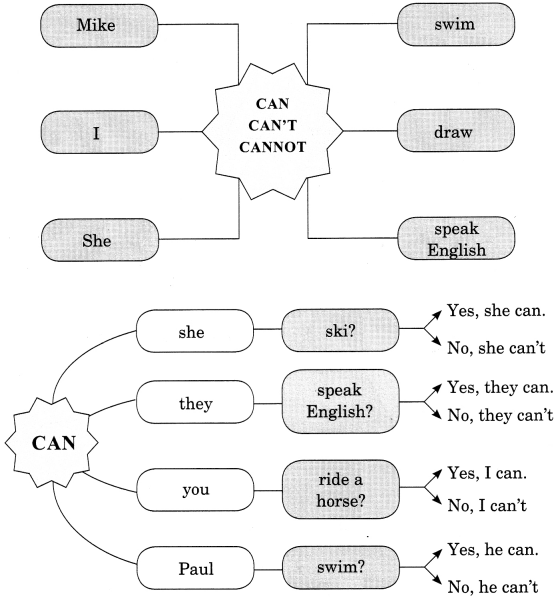
Modals Exercise For Class 7
Would/Will And May/Might
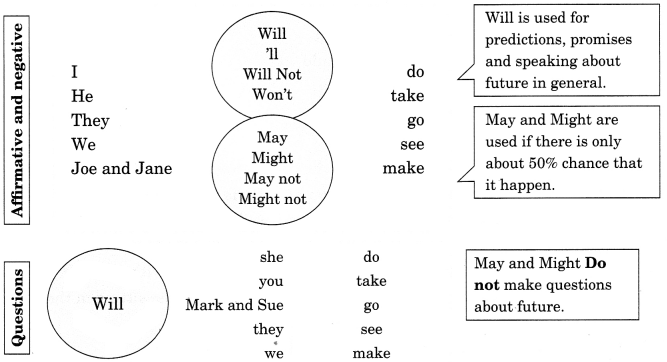
Modals Class 7 Exercise
Should And Must
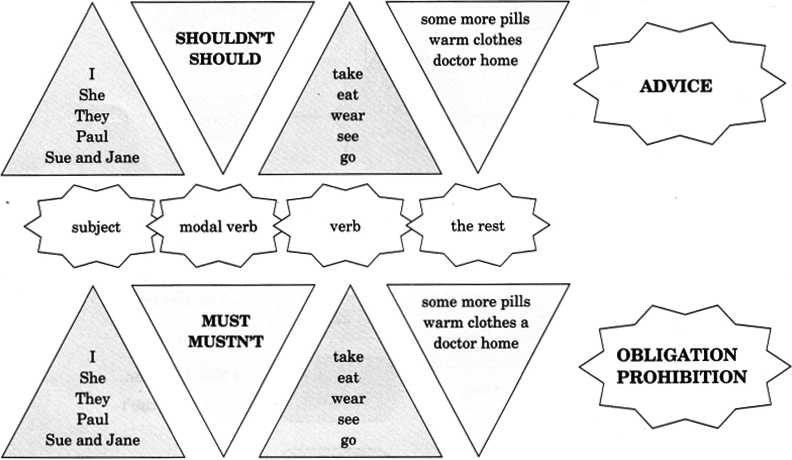
Mind Map Of Modals
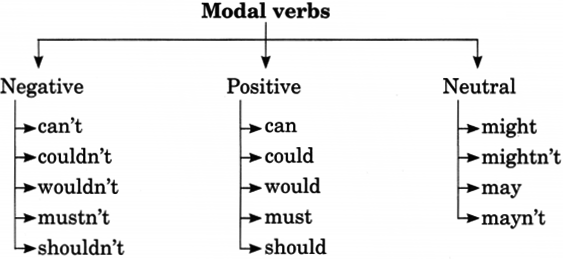
Modals for Class 7 CBSE Solved Exercise With Answers
Modals Exercises For Class 7 With Answers Pdf Question 1.
Fill in the blanks using must, mustn’t, don’t have to, should, shouldn’t, might, can, can’t!
- You really _________ go to the Louvre if you’re in Paris. It’s wonderful.
- You _________ come to the party if you don’t feel well.
- I don’t know where Kelly is. She _________ be at the sister’s house.
- You have passed all your tests. You _________ be very pleased with yourself.
- You _________ smoke in your car, especially if there are children sitting in the back.
- You _________ work this evening. I can do the tasks for you.
- John doesn’t need a calculator. He _________ do sums in his head.
- Passengers _________ open the door when the train is moving.
- It _________ rain today. It’s getting cloudy already.
- I _________ pay for the tickets because I got them from Sam for free.
Answer:
- must/should
- don’t have to
- might
- should
- shouldn’t/mustn’t
- don’t have to
- can
- mustn’t
- might
- don’t have to
Modals Exercise Class 7 Question 2.
Rewrite the sentences with can, may, must or have to.
Ex: Is that all right if I borrow your pen?
May/ Can I borrow your pen?
Don’t park your car on bends. It is illegal.
You _________________________
Perhaps she will agree with it. Who knows?
She _________________________
Our teacher asked us to tidy the classroom.
We _________________________
I need your help. It’s too much work for me.
You _________________________
Look at that balloon. It’s over there.
_________________________ see _________________________?
Don’t worry about dinner. I’ll make it.
You _________________________ It is not necessary to be there.
We _________________________
Why don’t you stay with us? No problem!
You _________________________
Answer:
Don’t park your car on bends. It is illegal.
You mustn’t/can’t park.
Perhaps she will agree with it. Who knows?
She may can agree with it.
Our teacher asked us to tidy the classroom.
We have to tidy.
I need your help. It’s too much work for me.
You must help me
Look at that balloon. It’s over there.
Can you see it?
Don’t worry about dinner. I’ll make it.
You needn’t worry It is not necessary to be there.
We don’t have to be Why don’t you stay with us? No problem! You can stay.
Modals For Class 7
Modals Practice Exercises for Class 7 CBSE
1. Complete each sentence with a suitable modal verb.
1. You ___________ queue up before boarding the bus.
2. The players ___________ to come for practice if they want to beat the other team.
3. If it rains tomorrow, we ___________ cancel the extra class.
4. ___________ you like to come to my house on Deepavali day?
5. She ___________ listen to her father’s advice about her future husband.
6. You ___________ help your parents at home.
7. He ___________ cook a delicious meal for ten in one hour.
8. You ___________ not take advantage of people’s weaknesses.
9. He ___________ not hesitate to lodge a complaint if it happens again.
10. Ali ___________ take a break after that back-breaking job.
11. The child ___________ be very naughty at times.
12. He ___________ leave for Australia immediately as his wife is in a critical condition.
Exercise On Modals For Class 7
2. Fill in the blanks by choice a correct option?
(i) I didn’t feel very well yesterday. I _______ eat anything.
(a) cannot
(b) couldn’t
(c) mustn’t
(ii) You _______ look at me when I am talking to you.
(a) could
(b) should
(c) would
(iii) I was using my pencil a minute ago. It _______ be here somewhere!
(a) can
(b) could
(c) must
(d) would
(iv) You really _______ be late again.
(a) must not
(b) don’t have to be
(v) If you don’t start working harder, you _______ repeat the course next year.
(a) have to
(b) must
(c) will have to
(vi) His parents spoil him. He’s always _______ to do whatever he wants.
(a) been able
(b) been allowed
(vii) Phone her now. She _______ home by now.
(a) has to be
(b) must be
(c) would be
Modals Exercises For Class 7 With Answers
(viii) You _______ forget your sun cream. It’s going to be very hot!
(a) don’t have to
(b) mustn’t
(c) needn’t
(ix) I _______ be able to help you, but I’m not sure yet.
(a) might
(b) mould
(x) Entrance to the museum was free. We _______ pay to get in.
(a) needn’t
(b) didn’t need to